Physical Address
304 North Cardinal St.
Dorchester Center, MA 02124

The Most Amazing Climbing and Biking Adventures in the Mountains of Germany
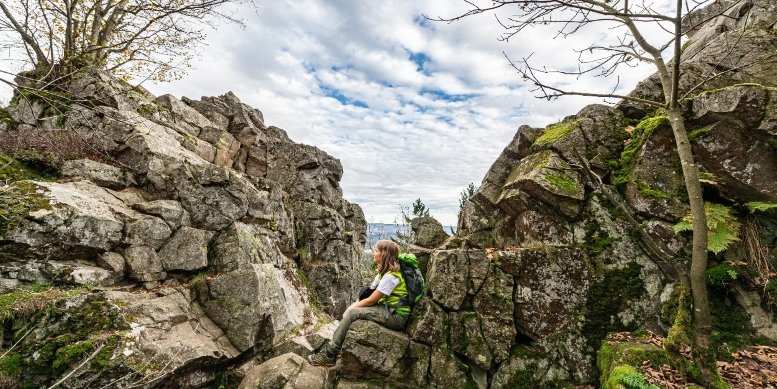
Climbing and Biking Adventures in the Mountains of Germany
Meta Description: Discover cheap flights and budget-friendly hotels for epic climbing and biking adventures in Germany’s stunning mountains. Your complete guide to Alpine thrills and undiscovered gems.
Picture this: you’re standing at the base of the Zugspitze, Germany’s highest peak, with your mountain bike beside you and climbing gear in your backpack. The crisp Alpine air fills your lungs, and ahead lies an adventure that’ll make your Instagram followers seriously jealous. Welcome to Germany’s mountain paradise, where cheap flights and budget-friendly hotels open the door to some of Europe’s most incredible climbing and biking experiences.
I’ll never forget my first encounter with Germany’s mountain magic. It was a foggy morning in Garmisch-Partenkirchen when I decided to tackle my first via ferrata route. What started as a simple climb turned into a life-changing adventure that showed me why Germany’s mountains are among Europe’s best-kept secrets.
Germany might not be the first country that comes to mind when you think of mountain adventures, but trust me, that’s exactly what makes it special. These undiscovered gems offer world-class climbing and biking without the crowds you’ll find in the Swiss or Austrian Alps.
The country’s diverse mountain ranges each tell their own story. From the dramatic limestone cliffs of Saxon Switzerland to the rolling hills of the Black Forest, every region offers unique challenges and breathtaking rewards. What really sets German mountains apart is their accessibility – you can literally take a train from Munich and be on a mountain trail within an hour.
The infrastructure here is phenomenal. Well-marked trails, mountain huts that serve hearty German meals, and rescue services that actually work make these mountains perfect for both beginners and seasoned adventurers. Plus, the locally loved spots that most tourists never discover will give you stories to tell for years.
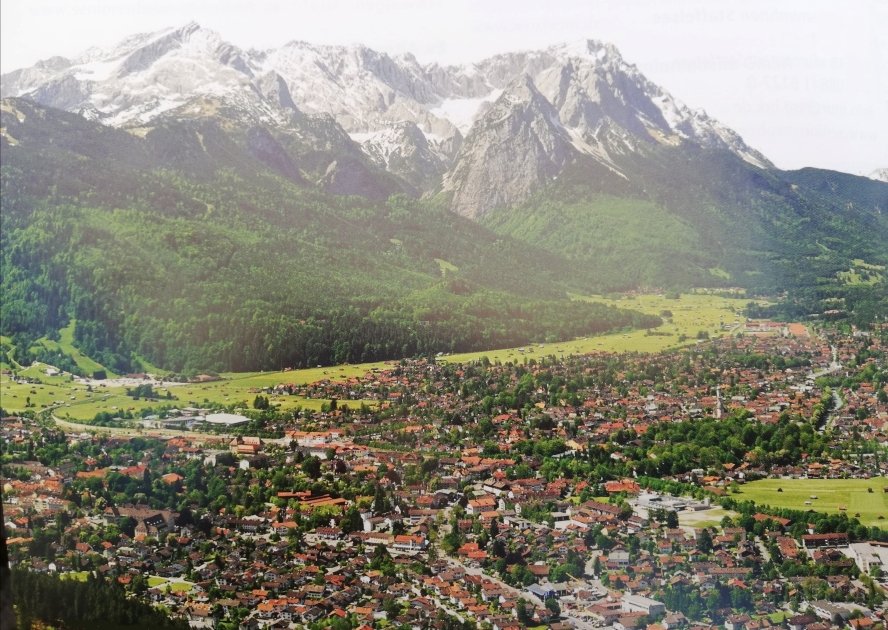
Garmisch-Partenkirchen
The Zugspitze isn’t just Germany’s highest peak at 2,962 meters – it’s a playground that’ll challenge every muscle in your body. The area around Garmisch-Partenkirchen offers some of the most diverse climbing and biking opportunities you’ll find anywhere in Europe.
For climbers, the Alpspitze Ferrata is absolutely mind-blowing. This via ferrata route takes you up nearly vertical rock faces with jaw-dropping views of the entire Alpine range. The exposure is real, but the safety systems are top-notch. I remember reaching the summit and feeling like I could touch the clouds – literally, because we were in them!
Mountain bikers will fall in love with the Partnach Gorge Trail. This route combines technical single-track sections with flowing descents through some of the most beautiful forest you’ve ever seen. The trail winds past waterfalls, through narrow gorges, and opens up to sweeping valley views that’ll make you stop and stare.
Pro tip: Book your accommodation early during summer months. The area gets busy, but you can still find budget-friendly hotels if you plan ahead. I stayed at a family-run pension for just €45 per night, complete with a massive German breakfast that fueled my adventures.
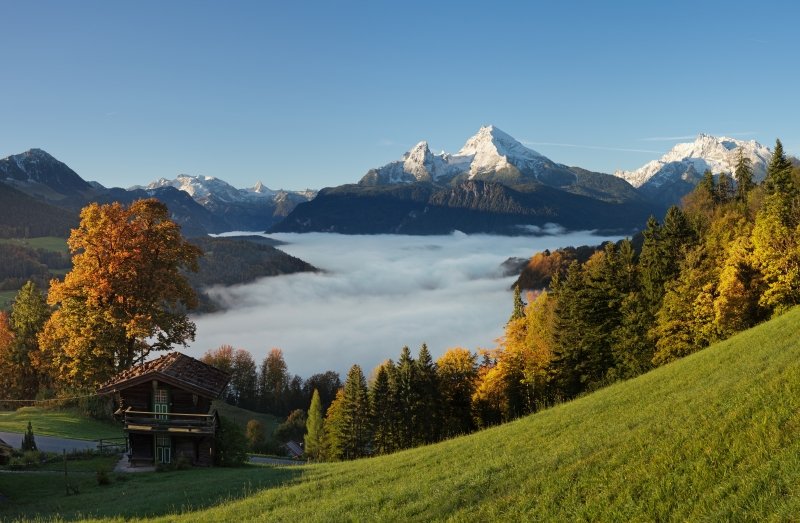
Berchtesgaden: Alpine Adventure at Its Finest
Berchtesgaden National Park is where fairy tales come to life. The Watzmann massif dominates the landscape, offering climbing routes for every skill level. The Watzmann East Face is legendary among climbers – it’s a serious undertaking that requires experience, but the reward is pure euphoria.
For a more accessible adventure, try the Jennerbahn area. You can take the cable car up and then bike down through Alpine meadows dotted with traditional wooden chalets. The smell of wildflowers and the sound of cowbells create an atmosphere that’s purely magical.
The Königssee area offers incredible family vacation ideas too. Gentle biking paths around the lake are perfect for families, while more adventurous souls can tackle the climbing routes on the surrounding peaks.
The Black Forest (Schwarzwald) is like stepping into a Brothers Grimm fairy tale, but with world-class mountain biking and climbing opportunities. This region is one of those off-the-beaten-path spots that serious adventurers dream about discovering.
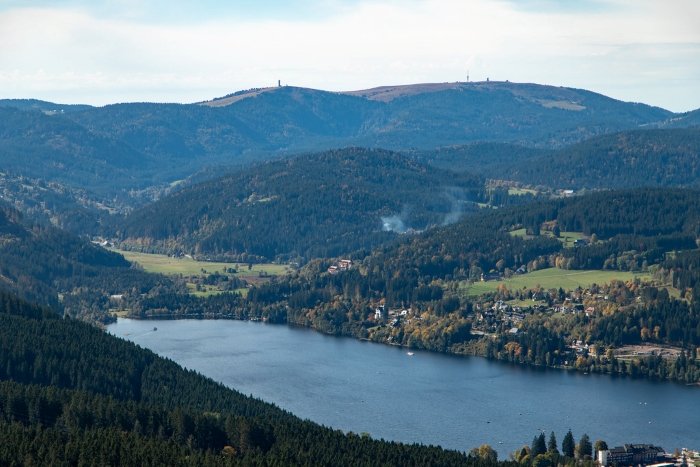
Feldberg: The Black Forest Giant
At 1,493 meters, Feldberg is the Black Forest’s highest peak, and it’s surrounded by some of the most diverse trail networks in Germany. The area offers everything from gentle family-friendly routes to technical challenges that’ll test your skills.
The Todtnau Single Trail is legendary among mountain bikers. This 16-kilometer descent drops nearly 1,000 meters through dense forest, over wooden bridges, and past hidden waterfalls. The trail is so well-designed that it feels like riding through a video game level.
Climbers shouldn’t miss the Battert Rocks near Baden-Baden. These sandstone formations offer hundreds of routes, from beginner-friendly climbs to overhanging monsters that’ll push your limits. The rock quality is exceptional, and the setting – overlooking the Rhine Valley – is absolutely stunning.
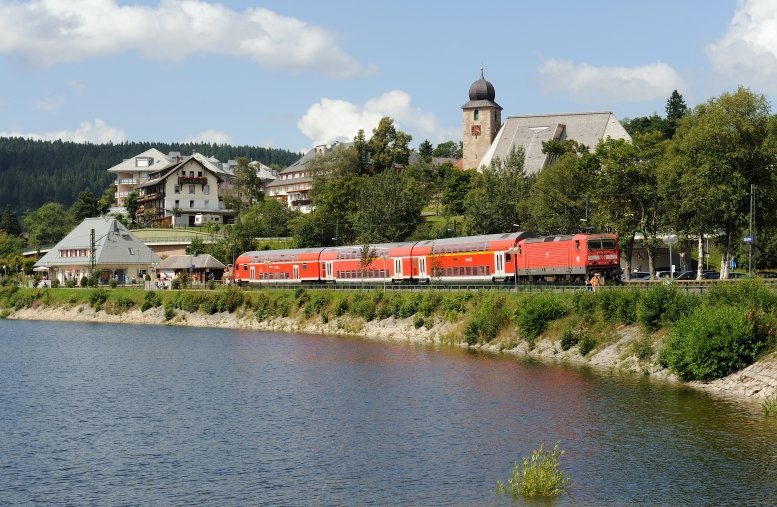
Titisee and Schluchsee: Alpine Lake Adventures
The area around these pristine lakes combines mountain adventures with the relaxation of lakeside camping. You can spend your morning conquering a challenging climb, then cool off with a swim in crystal-clear mountain water.
I spent a week here last summer, staying at a budget-friendly campground for just €12 per night. Every morning, I’d wake up to mist rising off the lake, grab my bike, and explore a different trail. Evenings were spent around campfires, sharing stories with fellow adventurers from across Europe.
Don’t let the name fool you – Saxon Switzerland is actually in Germany, along the Czech border. This region is a sandstone wonderland that offers some of the most unique climbing experiences in Europe.
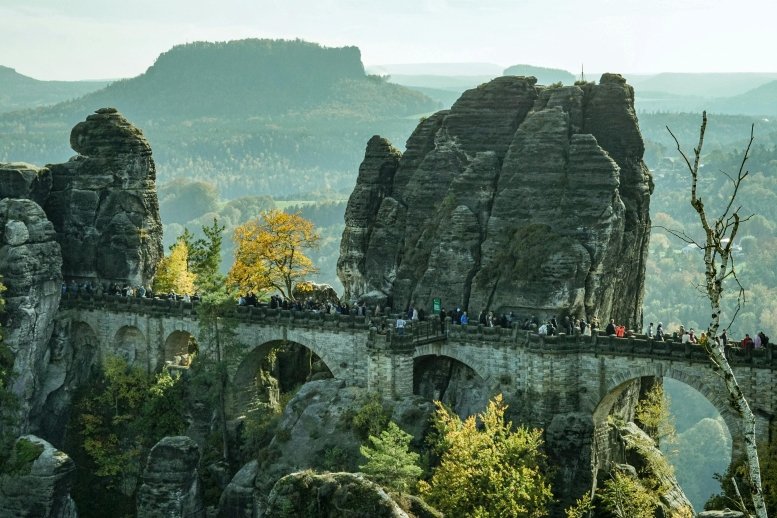
The Bastei: Iconic Climbing and Views
The Bastei rock formations are Instagram-famous for good reason. These towering sandstone pillars create a landscape that looks more like something from another planet than central Europe. The climbing here follows traditional Saxon rules – no metal protection, only knots and slings – which adds an element of adventure and requires solid technique.
The Bastei Bridge Trail is perfect for mountain bikers who want to combine cycling with sightseeing. The route takes you through medieval towns, past ancient castles, and up to viewpoints that’ll leave you speechless.
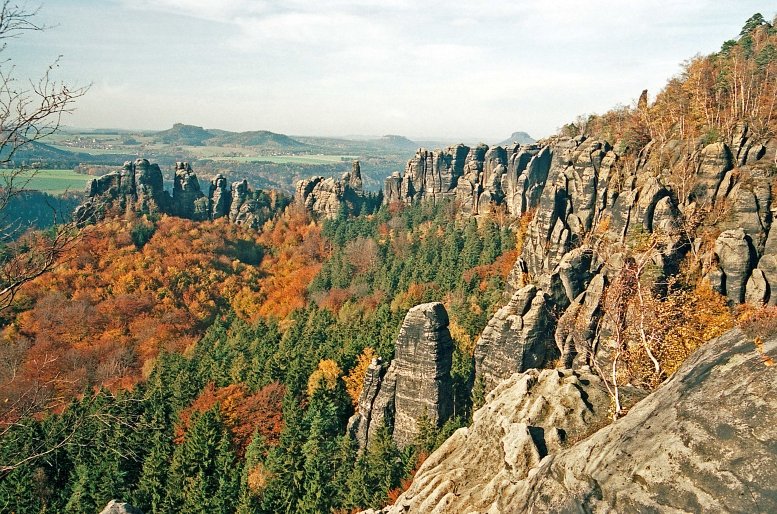
Schrammsteine: Technical Challenges
For experienced climbers, the Schrammsteine offer some of Germany’s most challenging routes. The rock quality is exceptional, and the exposure is real. Routes like Falkenstein and Bloßstock are considered classics that every serious climber should experience.
Mountain bikers can explore the Malerweg Trail, which winds through the most scenic parts of the national park. The trail is well-marked and offers options for all skill levels, from gentle family rides to technical challenges.
The Harz Mountains prove that you don’t need to break the bank for incredible mountain adventures. This region offers some of the most budget-friendly outdoor experiences in Germany, with cheap flights and budget-friendly hotels making it accessible to everyone.
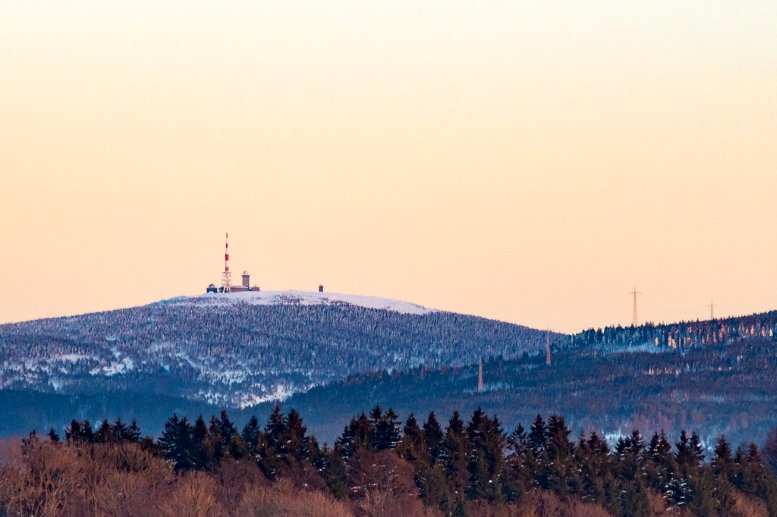
Brocken: The Mystical Peak
The Brocken (1,141m) is steeped in legend and offers unique adventures year-round. The mountain is famous for its mystical atmosphere – it’s often shrouded in clouds, creating an otherworldly environment that inspired countless fairy tales.
The Brocken Railway adds a unique twist to your adventure. You can bike to the base, take the historic steam train to the summit, then descend on foot or by bike. It’s a perfect example of how German mountain adventures can be both thrilling and culturally enriching.
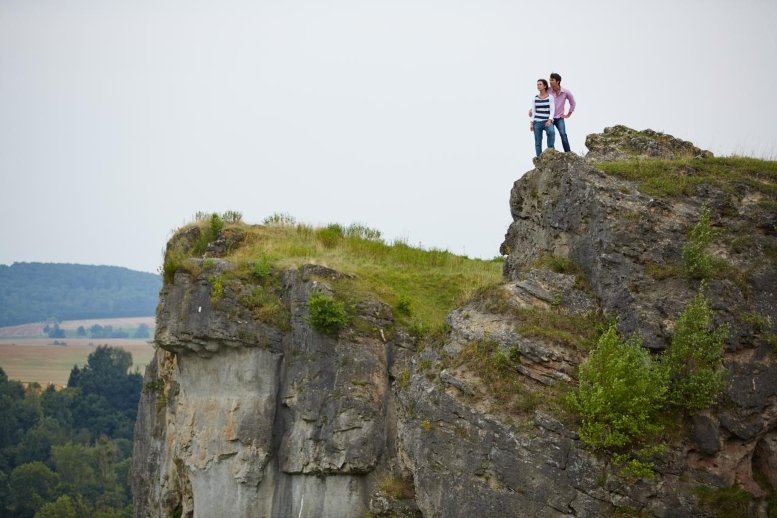
Climbing in the Harz
The Harz offers excellent granite climbing, particularly around the Oker Valley. The routes here are diverse, from easy multi-pitch climbs perfect for beginners to challenging technical routes that’ll test experienced climbers.
What I love about climbing in the Harz is the atmosphere. These mountains have a wild, untamed feeling that’s different from the more developed Alpine regions. You might find yourself completely alone on a beautiful route, surrounded by dense forest and the sounds of nature.
Germany’s mountains aren’t just for extreme athletes – they’re perfect for family vacation ideas that create lifelong memories. The infrastructure and safety standards make these mountains ideal for introducing kids to outdoor adventures.
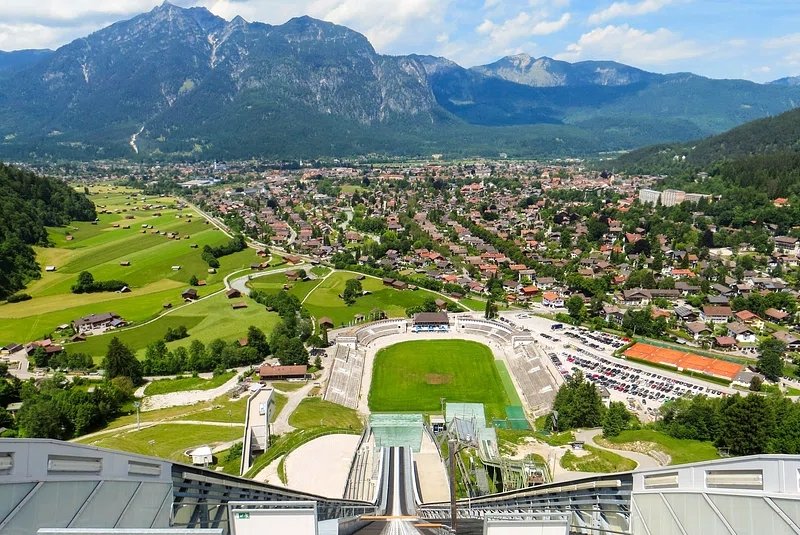
Garmisch-Partenkirchen: Alpine Family Fun
The Partnach Gorge is absolutely magical for families. The walkway through the gorge is safe and accessible, but dramatic enough to keep kids engaged. The roar of the water, the cool mist, and the towering rock walls create an adventure that feels like exploring a hidden world.
The Alpspix viewing platform is accessible by cable car and offers stunning views without requiring any technical skills. Kids love the glass observation deck, and parents appreciate the safety barriers and facilities.
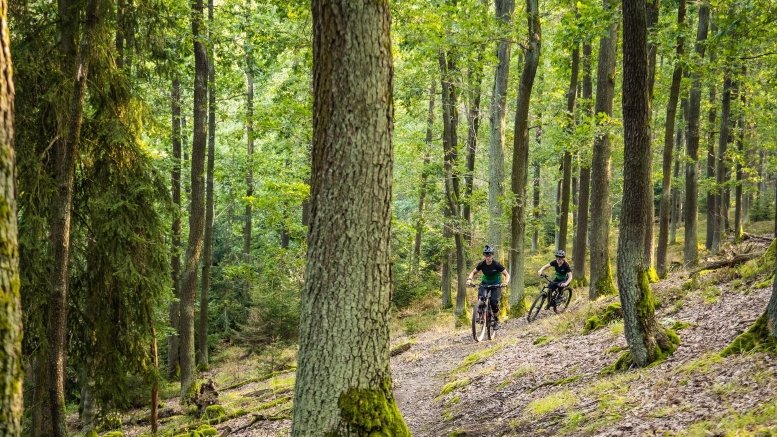
Black Forest-Gentle biking trails
The Black Forest is perfect for families who want to combine mountain adventures with cultural experiences. The region’s numerous family vacation ideas include:
Experiencing Germany’s mountain adventures doesn’t have to cost a fortune. Here are proven strategies for keeping costs down while maximizing your adventure:
Mountain huts are your best friend for budget adventures. These traditional Alpine lodges offer beds for €15-25 per night and serve hearty meals that’ll fuel your adventures. The atmosphere is incredible – sharing stories with fellow adventurers from around the world over a beer and traditional German food.
Camping is legal in designated areas and costs €8-15 per night. Many campgrounds offer spectacular mountain views and access to trails right from your tent.
Budget hotels in smaller towns often cost half what you’d pay in major tourist centers. Towns like Mittenwald, Oberammergau, or Bad Harzburg offer authentic German mountain experiences at prices that won’t break your budget.
The German Rail Pass is incredible value for mountain adventurers. For €272, you get unlimited train travel for a week, including access to mountain railways and cable cars in some areas.
FlixBus connects major cities to mountain towns for as little as €9. I’ve taken overnight buses from Berlin to Munich, arriving fresh and ready for mountain adventures.
Cheap flights to Germany are surprisingly common, especially if you’re flexible with dates. Flying into Frankfurt or Munich often provides the best access to mountain regions.
Self-catering can save significant money. German supermarkets offer high-quality hiking food, and mountain towns have excellent outdoor gear shops with reasonable prices.
Gear rental is widely available and often cheaper than bringing your own equipment, especially for specialized items like via ferrata gear or high-end mountain bikes.
Understanding German mountain culture will enhance your experience and help you connect with locals who can share their favorite undiscovered gems.
Germans take mountain safety seriously, and following local customs shows respect for both the environment and other adventurers:
Mountain huts (Berghütten) are central to German mountain culture. These refuges offer more than just accommodation – they’re community centers where adventurers share experiences and local knowledge.
Reservations are essential, especially during summer months. Most huts offer half-board (breakfast and dinner), which is excellent value and provides hearty mountain food.
Cash is king at mountain huts – many don’t accept cards, so bring enough euros for your stay.
While many Germans speak English, learning a few key phrases enhances your experience:
Summer offers the best weather and longest days, but also the biggest crowds and highest prices. This is prime time for family vacation ideas and multi-day adventures.
June brings wildflower blooms and moderate crowds. Weather can be unpredictable, but the landscapes are incredibly beautiful.
July-August offer the most reliable weather and longest days, but expect crowds at popular destinations. Book budget-friendly hotels well in advance.
September is my personal favorite – stable weather, fewer crowds, and stunning autumn colors begin to appear.
Spring offers excellent value with cheap flights and budget-friendly hotels widely available. Lower elevations are perfect for adventures, while higher peaks may still have snow.
German mountains transform into winter wonderlands. While traditional hiking and climbing are limited, opportunities for ski touring, ice climbing, and winter mountaineering abound.
Autumn is perfect for discovering locally loved spots without crowds. Weather can be unpredictable, but the rewards include stunning colors and incredible solitude.
Munich Airport (MUC) is the primary gateway for Bavarian Alps adventures. The airport connects directly to Garmisch-Partenkirchen and other mountain towns via train.
Frankfurt Airport (FRA) offers the most international connections and good access to the Black Forest and Harz Mountains.
Budget airlines like Ryanair and EasyJet serve smaller airports that can provide cheaper access with some additional travel time.
Germany’s public transportation system is exceptional for mountain access. The integration between trains, buses, and cable cars makes car-free mountain adventures not just possible, but enjoyable.
Regional day passes often include public transport plus cable cars and provide excellent value for day adventures.
Book your flights to Germany and start planning your mountain adventure today!
DAV Huts (German Alpine Club) offer the most authentic mountain experience. These refuges provide simple but comfortable accommodation, hearty meals, and incredible atmosphere.
Prices range from €15-35 per night for members (€20-45 for non-members). Becoming a DAV member costs €62 annually and provides significant savings for frequent mountain travelers.
Hostels in mountain towns offer dorm beds for €20-30 per night. Many include breakfast and provide gear storage and drying facilities.
Pensions (family-run guesthouses) provide authentic local experiences for €40-60 per night, often including breakfast and local recommendations.
Farm stays combine accommodation with cultural experiences, often including opportunities to help with daily tasks and enjoy fresh, local food.
Mountain hotels in towns like Garmisch-Partenkirchen or Baden-Baden offer comfort and convenience for €80-120 per night.
Many include spa facilities perfect for recovery after challenging adventures, plus restaurants serving regional specialties.
Find budget-friendly hotels for your German mountain adventure.
Established campgrounds offer facilities like showers, laundry, and equipment rental for €10-20 per night.
Wild camping is generally prohibited in Germany, but designated areas in some regions offer primitive camping experiences.
Via ferrata sets are essential for many Alpine routes. Quality sets cost €150-200, but rental options are available in most mountain towns for €15-20 per day.
Climbing shoes suited to German rock types (limestone in the Alps, sandstone in Saxon Switzerland) are crucial for performance and safety.
Helmets are mandatory on most via ferrata routes and recommended for traditional climbing due to rockfall potential.
Full-face helmets are recommended for technical downhill trails, especially in bike parks.
Protective pads (knee, elbow, back) provide confidence on challenging terrain.
Quality suspension is essential for technical trails – consider renting high-end bikes rather than bringing basic equipment.
Weather awareness is crucial – German mountains can experience rapid weather changes. Always check forecasts and be prepared to turn back.
Navigation tools including maps, compass, and GPS devices are essential. Trail marking is generally excellent, but weather can obscure signs.
Emergency procedures – know how to contact mountain rescue (call 112) and carry basic first aid supplies.
Layered clothing for variable mountain weather Waterproof jacket and pants – German mountains get significant precipitation Sturdy hiking boots with good ankle support Headlamp for early starts or emergency situations High-SPF sunscreen – Alpine sun is intense at elevation Plenty of water and high-energy snacks
| Region | Best For | Difficulty Level | Budget Level | Best Season |
|---|---|---|---|---|
| Bavarian Alps | Alpine climbing, via ferrata | Advanced | €€€ | June-September |
| Black Forest | Mountain biking, family adventures | Beginner-Intermediate | €€ | May-October |
| Saxon Switzerland | Technical rock climbing | Intermediate-Advanced | €€ | April-October |
| Harz Mountains | Budget adventures, mystical experiences | Beginner-Intermediate | € | Year-round |
Every region has its secrets – those locally loved spots that don’t appear in guidebooks but offer incredible experiences:
Nebelhorn’s North Face offers world-class climbing with virtually no crowds. Local climbers guard this secret jealously, but friendly conversation in mountain huts might earn you directions.
The Westweg Alternative Route bypasses tourist areas and follows ancient shepherd paths through pristine forest. Ask at the tourist office in Pforzheim for detailed directions.
Schrammtor offers incredible climbing with dramatic exposure, but most tourists miss it completely. Local climbing shops in Bad Schandau can provide route information.
The region’s mining heritage includes climbing opportunities in abandoned quarries. These aren’t officially sanctioned, but local climbing clubs organize informal gatherings.
Q: Do I need special permits for climbing in German mountains? A: Most climbing areas are freely accessible, but some regions require registration or have seasonal restrictions. Saxon Switzerland has specific rules about protection use. Always check local regulations.
Q: How difficult is it to find English-speaking guides? A: Mountain guide services in tourist areas typically offer English-speaking guides. The German Alpine Association (DAV) also provides international services.
Q: What’s the cell phone coverage like in German mountains? A: Coverage is generally good in valley areas and on major peaks, but can be spotty in remote locations. Download offline maps and inform others of your planned route.
Q: Are German mountain restaurants expensive? A: Mountain huts and restaurants are reasonably priced considering their remote locations. Expect €8-15 for substantial meals. Bringing your own food is also acceptable.
Q: How crowded do the mountains get? A: Popular areas like Zugspitze can be very busy on weekends and holidays. Weekdays and shoulder seasons offer more solitude. Early starts also help avoid crowds.
Q: Is it safe to adventure alone in German mountains? A: German mountains are generally safe for solo adventures, but standard mountain safety applies. Inform others of your plans, carry emergency equipment, and know your limits.
Q: What about mountain biking trail etiquette? A: Yield to hikers, announce yourself when passing, stay on designated trails, and respect seasonal closures. Many areas have specific mountain bike routes.
Q: How do I access technical weather forecasts? A: The German Weather Service (DWD) provides detailed mountain forecasts. Local mountain guide offices also offer current condition reports.
Germany’s mountains offer adventures that’ll change how you think about European outdoor experiences. From the dramatic limestone walls of the Bavarian Alps to the mystical forests of the Harz, every region provides unique challenges and unforgettable memories.
The combination of cheap flights and budget-friendly hotels, excellent infrastructure, and diverse terrain makes Germany perfect for both budget-conscious adventurers and those seeking luxury mountain experiences. Whether you’re planning family vacation ideas or looking for unexplored paradises to challenge your skills, German mountains deliver experiences that’ll have you planning your return trip before you’ve even left.
The magic isn’t just in the climbs or the trails – it’s in the culture, the people, and the way these mountains make you feel. From sharing stories in mountain huts to discovering locally loved spots that take your breath away, Germany’s mountains offer adventures that go far beyond physical challenges.
Ready to discover hidden pleasures and uncover unexplored wonders in Germany’s incredible mountain landscapes? Book your flights, find your perfect hotel, and arrange your transfers with Travel Go Easy. Your German mountain adventure awaits!
This content is exclusive to Travel Go Easy and protected from unauthorized copying. For more inspiration, explore our guides to Cultural Experiences, Nature & Wildlife, Historical Wonders, Hidden Gems, Planning Travel Trips, Popular Destinations, Planning Tourist Routes, Family Trip Planning, and Tropical Escapes.
© 2025 This article is protected by copyright and exclusive to Travel Go Easy. Unauthorized reproduction or use is strictly prohibited.
From the dramatic limestone walls of the Bavarian Alps to the mystical forests of the Harz, every region provides unique challenges and unforgettable memories.





[…] Get Started Now […]